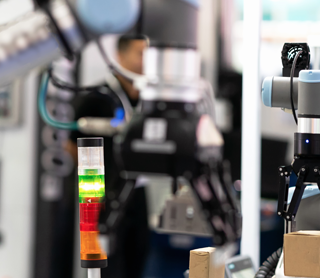What Are The Everyday Values Of Traceability in Manufacturing?
As well as providing assurance that all production processes have been executed precisely according to manufacturing intent, traceability data is often used as a key constituent of the ultimate quality tool. Traceability is at the heart of the FactoryLogix MES (Manufacturing Execution System) operation. Examples of the different areas of value from traceability data include:
Elimination of one-off defects:
Where a one-off defect has occurred in a batch of products, analysis of traceability data reveals the unique set of often complex circumstances that contributed to the instance of the defect, providing assurance that the defect is unique to that instance, or identifying the group of products that may share a weakness. As the root cause is found, corrective action can then be implemented that prevents such defect-creating circumstances from repeating, assuring no further defects of this cause.
Material Assurance:
Should there be a concern related to the quality or integrity of any material, based on, for example, a suspect batch, lot, date code, carrier ID, vendor, supplier etc., the use of traceability data will identify each specific product that may be have been affected, such that time and costs relating to inspection and rework are minimized.
Conformance & Compliance:
Traceability data is proof of correct manufacture, including all process-related data, as well as materials. This data establishes a “digital best practice” for the operation that directly satisfies various regulatory requirements for operational activities, irrespective of the specific sector. The cost and time needed to create such compliance reports are almost eliminated.
What Constitutes Traceability Data?
There are several different elements within the traceability dataset. The most significant of these is as follows:
- Material traceability: Provides precise quality and inventory control of materials, including the direction of actions required as a result of a quality issue, including any incidence of counterfeit materials. The scope of any material related issue is quickly identified and quantified, with FactoryLogix automatically putting affected material, and those products and assemblies that have been manufactured using that material, into a quarantine condition, enforcing inspection. Each material carrier is identified by a unique ID with associated data including information about the origin of the part, the receiving package into the factory, information about the supplier, vendor, original quantity etc., with real-time update of the current location, remaining quantity and logistics records, as well as specific consumption and spoilage data.
- Product traceability: With each production unit identified by a unique ID, product traceability data comprises a record of each production station visited on an individual basis, with timestamps recorded as each production unit enters and leaves each production station. In addition, the result of each process in terms of pass and fail is captured, enabling precise tracking and routing control.
- Process traceability: For each uniquely identified production unit, data is gathered at each production station, which includes an electronic test record, as well as details of any measurements and individual test results. Process traceability data is most often used to manage and monitor quality and rework processes, as well as providing data for analysis of variations in production processes that left unchecked, may escalate to create production defects.
What Are The Costs of Traceability Software?
As an inclusive part of the FactoryLogix MES solution, the values and benefits from the use of traceability far exceed costs associated with data collection and reporting, meaning that the overall cost of ownership and operation of traceability is effectively zero. There are very few instances in which actions specifically required for traceability itself involve an incremental cost to the operation. Data is captured automatically from all types of production endpoints where possible, then processed, contextualized, and stored as parts of traceability, relieving the vast majority of costs traditionally associated with traceability data collection.
An often hidden cost of traceability is the time and effort needed when access to material, product, or process traceability data reports are required for some purpose. With FactoryLogix, since all of the data has been automatically contextualized into a single “language”, the use of traceability is therefore quick, easy, reliable, and complete, eliminating the risk that certain key data may be missed, inaccessible, or found to have been misunderstood when needed.
Why Should Traceability Be Important To Me?
As realistic and responsible companies in any area of discrete manufacturing, we have to accept that things happen that affect production quality, which are often outside of our control, such as unexpected variance in the performance of an automated process, or irregularities in the quality of procured materials found during test. In such cases, the mandate to the customer is to provide every product in as perfect a condition as possible. The ability to quickly recognize potential issues, to have the tools available to immediately discover their root causes, to apply an adjustment to the operation, as well as to make appropriate corrections to products already made, minimizes the scope and consequence of any work required that may otherwise delay production or shipping, incurring significant costs and waste. A lack of traceability simply means that the total of all unavoidable variations is reflected in the quality of the end product, which carries a high risk of disappointment, ultimately affecting customer confidence, brand image etc., resulting in reduced business opportunity.
Is Traceability The Same As Digital Thread?
In essence, traceability is the core of the Digital Thread, which is the record of every aspect of the manufacturing lifecycle of each product. One key difference in perception is that the Digital Thread is a complete record, whereas in many instances, traceability has been associated with particular areas in isolation, such as traceability data from an individual machine, process, line, etc. not specifically linked to the other manufacturing steps, and which may only include certain elements of the whole traceability content spectrum. Traceability within FactoryLogix is a Digital Thread approach, in that all traceability data from all processes involved in manufacturing are contextualized and combined into one holistic resource, which includes the association of data related to planning, routing, material logistics and conditioning, etc.
Part & Product Traceability Impact On The Supply-Chain
The security of the supply chain has never been more at risk, with shortages of selected key materials, including complex semiconductors, triggering the ingress of “non-perfect” materials into the supply chain. The use of traceability within the cyber-secure manufacturing facility is essential in order that any discrepancies or concerns with materials can be tracked and traced, without doubt, back to the source of the issue, in this case, the specific incoming packages, batches, or individual carriers of materials and sub-assemblies. In this way, traceability becomes a critical piece of the overall secure supply-chain, whereby responsibility for material=related issues can be correctly and immediately identified. A key aspect of traceability in this scenario is the inclusion of materials that are not, or cannot be individually identified, such that they can still be reliably associated to individual products, using the unique carrier IDs and product IDs that FactoryLogix generates, together with information related to the setup verification of material stations, and subsequent traceability data flow from the machines as they consume materials.
Security Of Traceability Data / The Secure Supply-Chain (Blockchain)
Within a cyber-secure facility, the regular IT security provision for traceability data is sufficient in almost all cases.
The IPC-1782A standard specifically describes the connection of internal traceability data with that of materials and sub-assemblies that are transported between secure locations. During the logistics operation, a crypto-anchor is created using a physical immutable ID, on otherwise anonymous tamper-evident packaging. On the digital side, blockchain is used to provide a tamper-free data storage environment that allows access to records related to various operations that take place during the logistics process. This establishes the responsibility for the content of each package. Linking the traceability data from manufacturing to the data associated with the incoming package allows the specific responsibility for any material issues to be pinpointed within the whole supply chain.
FactoryLogix provides all of the traceability information for use in the Secure Supply-Chain from the manufacturing perspective in accordance with IPC-1782A.
Traceability System Requirements & Best Practices For Manufacturing
There are varying requirements in the level of traceability detail and precision required, depending on the nature of the product that is being manufactured. The appropriate levels of traceability for both materials and process are defined in the IPC-1782A standard, against the IPC product classification matrix. The use of the standard ensures that discussion of exactly what data should be included in traceability, in any scenario, can be quickly understood.
From the perspective of FactoryLogix, all levels of IPC-1782A internal traceability are supported as standard, though constraints may exist based on legacy machine communication capability. Those machines with IPC-2591 (Connected Factory Exchange) CFX IIoT standard accreditation, support all requirements for fully automated traceability data transfer.
The following points should also be considered as part of “Best Practice” adoption:
Use of Automated IIoT-based Data Acquisition
FactoryLogix built-in ontology for traceability ensures that all available traceability data, whether captured from automated sources such as machine interfaces, or manual sources such as operator data entry at assembly or quality stations, is contextualized in order to make available meaningful traceability reports at a moments notice, that are consistent and complete. In terms of best practice, the IPC Connected Factory Exchange (CFX) IIoT interface is the preferred data collection mechanism. Data collected through CFX from IPC certified and accredited machines, ensures that the detail, accuracy and timeliness of data is assured. FactoryLogix single IIoT platform infrastructure makes this the most convenient, efficient and effective method, with lowest cost of ownership.
Unique Identifiers
Products, sub-assemblies, and materials should each have a unique ID assigned. In some cases, individual materials may be identified, such as a battery, screen etc., or a set of materials is identified as a bulk package, such as on a reel or in a box. Storage and setup areas for materials should also be uniquely labelled. FactoryLogix provides utilities to do this.
Procedures For Exact Traceability
In rare cases, operational procedures need to be assessed and potentially altered where the precise ID of material in use may not be determined. For example, certain automated and manual processes accept the simultaneous setup of multiple sets of materials, with the ability to swap them in and out as determined by the operation. In such cases, and where exact traceability is required, the processes must be able to communicate events relating to the specific material choice, or the operation should be changed so as to not allow the mixing of materials within the process at the same time. If neither solution is possible, the FactoryLogix traceability data would reflect that there was one of two possibilities, a condition that satisfies all but the highest traceability requirement levels. It is worthwhile doing an audit of process capabilities with reference to materials should exact traceability be an essential requirement.
Post-Manufacturing Operations
It is equally important to capture traceability from non-production stages, such as if a material is replaced or re-processed at a repair station.
Assistance is available from Aegis to help identify any issues related to traceability data collection.
Key Steps to Achieving Traceability
Though the benefits from the use of traceability in isolation are compelling, the operations associated with traceability data capture are usually accompanied by other functions provided by the MES operation overall, such as:
- Active Quality Management, which includes the use and management of quality data, the application of incoming material inspection, digital CAPA / FRACAS procedures, etc.
- Lean Material Management, which controls material logistics using “pull” technology, eliminating material inventory discrepancies, reducing unnecessary material over-stocks and shop-floor WIP, as well as increasing material turns.
The selection of MES functions will determine the detail, precision, and value of traceability data, and vice-versa, the need for a level of traceability will determine the MES module combination that provides the best solution. Advice to help find the exact requirement is available from Aegis.








